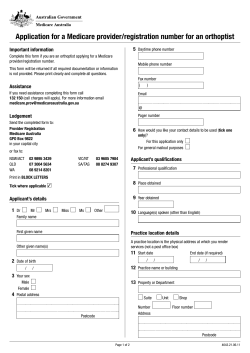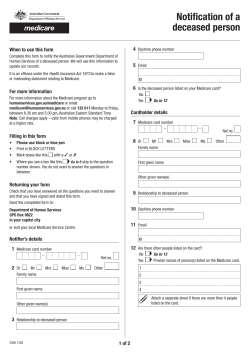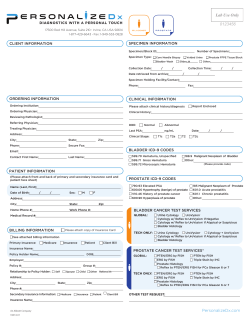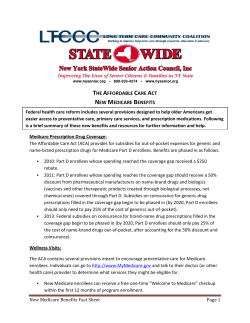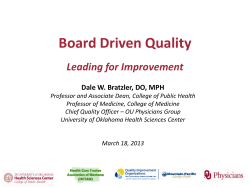
OFFICE OF INSPECTOR GENERAL Are Medicare Allowances for Albuterol Sulfate Reasonable?
Department of Health and Human Services OFFICE OF INSPECTOR GENERAL Are Medicare Allowances for Albuterol Sulfate Reasonable? JUNE GIBBS BROWN Inspector General AUGUST 1998 OEI-03-97-00292 OFFICE OF INSPECTOR GENERAL The mission of the Office of Inspector General (OIG), as mandated by Public Law 95-452, is to protect the integrity of the Department of Health and Human Services programs as well as the health and welfare of beneficiaries served by them. This statutory mission is carried out through a nationwide program of audits, investigations, inspections, sanctions, and fraud alerts. The Inspector General informs the Secretary of program and management problems and recommends legislative, regulatory, and operational approaches to correct them. Office of Evaluation and Inspections The Office of Evaluation and Inspections (OEI) is one of several components of the Office of Inspector General. It conducts short-term management and program evaluations (called inspections) that focus on issues of concern to the Department, the Congress, and the public. The inspection reports provide findings and recommendations on the efficiency, vulnerability, and effectiveness of departmental programs. OEI's Philadelphia Regional Office prepared this report under the direction of Robert A. Vito, Regional Inspector General and Linda M. Ragone, Deputy Regional Inspector General. Principal OEI staff included: REGION HEADQUARTERS Linda M. Ragone, Project Leader Cynthia R. Hansford, Program Assistant Lisa A. Foley, Program Specialist Stuart R. Wright, Program Specialist To obtain copies of this report, please call the Philadelphia Regional Office at 1-800-531-9562. Reports are also available on the World Wide Web at our home page address: http://www.dhhs.gov/progorg/oei EXECUTIVE SUMMARY PURPOSE To determine if the current Medicare allowance for albuterol sulfate is reasonable. BACKGROUND Albuterol sulfate is a prescription drug commonly used for inhalation therapy. Medicare allowed $178 million for albuterol sulfate 0.083% in 1996 and over $200 million in 1997. On January 1, 1998, as a result of the Balanced Budget Act of 1997, Medicare Part B began reimbursing prescription drugs at 95 percent of average wholesale prices. Prior to January 1998, Medicare allowances for drugs were set at the average wholesale price. Medicare allowances include both the Medicare payment and the 20 percent coinsurance amount for which the Medicare beneficiary is responsible. For albuterol sulfate and other drugs where both brand name and generic versions are available, reimbursement is based on 95 percent of the median average wholesale prices for all generic sources. However, if a brand name product's average wholesale price is lower than the median generic price, a new median including the brand name product must be calculated. Based on a provision within the Balanced Budget Act of 1997, Medicare can diverge from a statutorily prescribed payment method if its application results in a payment amount that is not inherently reasonable. Another provision of the Act authorizes up to five competitive bidding demonstrations in the Medicare fee-for-service program. This report provides: (1) information from previously published Office of Inspector General (OIG) reports pertaining to albuterol sulfate, and (2) new updated information on the appropriateness of Medicare allowances for albuterol sulfate. FINDINGS Previous OIG reports identified excessive Medicare payments for albuterol sulfate. o Medicare and its beneficiaries paid $34 million more than Medicaid for albuterol sulfate in 17 States during a 14-month period ending February 1995. o Supplier acquisition costs are substantially lower than Medicare reimbursement for albuterol sulfate. o Customers of mail-order and retail pharmacies were able to purchase albuterol sulfate for less than what Medicare allowed. Current information continues to prove that Medicare and its beneficiaries pay too much for albuterol sulfate. ))))))))))) iii o Medicare will allow between 56 to 550 percent more than the Department of Veterans Affairs will pay for generic versions of albuterol sulfate in 1998. o Medicare allowed 20 percent more than the average Medicaid payment for albuterol sulfate in 1997. o Medicare allowed up to 333 percent more than acquisition costs available for albuterol sulfate in 1998. o Customers of mail-order pharmacies will pay up to 30 percent less than Medicare for albuterol sulfate in 1998. RECOMMENDATIONS The findings of this report continue to provide evidence that Medicare and its beneficiaries are making excessive payments for albuterol sulfate. We believe that the information in this report provides further support for recommendations made by the Office of Inspector General. We previously recommended, and HCFA concurred, that HCFA reexamine its Medicare drug reimbursement methodologies, with the goal of reducing payments as appropriate. We outlined a number of options for implementing this recommendation, including: (1) greater discounting of published average wholesale prices, (2) basing payment on acquisition costs, (3) establishing manufacturers’ rebates, and (4) permanent authority to use competitive bidding. We continue to support the need for a comprehensive statutory reform of Medicare's prescription drug reimbursement methodology. A number of proposals addressing reform have been offered by both the Administration and members of Congress. However, until legislation can be passed providing for such reform, we believe that HCFA should use its inherent reasonableness or competitive bidding authorities to reduce Medicare payments for albuterol sulfate. The Balanced Budget Act of 1997 provides HCFA with new inherent reasonableness authority that can be applied to most Part B services. Specifically, the statute allows for up to 15 percent annual adjustments in Medicare reimbursement rates without promulgating rules in the Federal Register. Adjustments in excess of 15 percent continue to require promulgation of regulations. We recommend that HCFA: (1) immediately reduce Medicare reimbursement for albuterol sulfate by 15 percent using the new authority outlined in the Balanced Budget Act of 1997, and (2) consider promulgating rules for a greater reduction in albuterol sulfate reimbursement. A 15 percent reduction in 1997 would have saved Medicare $30 million. Alternatively, HCFA could use competitive bidding as a method to reduce Medicare payments for albuterol sulfate. The Balanced Budget Act provided HCFA the authority to conduct up to five demonstrations using this approach. AGENCY COMMENTS The HCFA concurred with the intent of our recommendations. However, it wants to give Congress the opportunity to act on the Administration’s legislative proposal to reduce drug payments before considering the use of its inherent reasonableness authorities. The ))))))))))) iv Administration’s fiscal year 1999 budget proposes to eliminate the overpayment on outpatient drugs by reimbursing physicians and suppliers at their acquisition costs. We support the need for a comprehensive legislative solution to Medicare’s drug reimbursement methodology. However, until legislation is passed, we believe that HCFA should utilize the authority recently provided by Congress to take an immediate 15 percent reduction in albuterol sulfate reimbursement. ))))))))))) v TABLE OF CONTENTS PAGE EXECUTIVE SUMMARY . . . . . . . . . . . . . . . . . . . . . . . . . . . . . . . . . . . . . . . . . . . . . . . . . . . i INTRODUCTION . . . . . . . . . . . . . . . . . . . . . . . . . . . . . . . . . . . . . . . . . . . . . . . . . . . . . . . . . . 1 FINDINGS . . . . . . . . . . . . . . . . . . . . . . . . . . . . . . . . . . . . . . . . . . . . . . . . . . . . . . . . . . . . . . . . 6 Previous reports identified excessive payments . . . . . . . . . . . . . . . . . . . . . . . . . . . . . . . . . . . . 6 Current information provides support for a decrease in payments . . . . . . . . . . . . . . . . . . . . . . 7 RECOMMENDATIONS . . . . . . . . . . . . . . . . . . . . . . . . . . . . . . . . . . . . . . . . . . . . . . . . . . . . 9 APPENDIX A: Health Care Financing Administration Comments . . . . . . . . . . . . . . . . . . . A - 1 INTRODUCTION PURPOSE To determine if the current Medicare allowance for albuterol sulfate is reasonable. BACKGROUND Albuterol sulfate 0.083% is a prescription drug commonly used for inhalation therapy. This drug may be administered to a patient through a piece of durable medical equipment (DME) known as a nebulizer. Patients with conditions such as asthma or emphysema may require treatment with nebulizers. Medicare does not generally pay for outpatient prescription drugs. However, Medicare Part B will cover drugs if they are necessary for the effective use of DME. Medicare allowed $178 million for albuterol sulfate 0.083% in 1996 and over $200 million in 1997. Medicare Reimbursement of Albuterol Sulfate On January 1, 1998, as a result of the Balanced Budget Act of 1997, Medicare Part B began reimbursing prescription drugs at 95 percent of average wholesale prices (AWPs). Prior to January 1998, Medicare allowances for drugs were set at the average wholesale price. Medicare allowances include both the Medicare payment and the 20 percent coinsurance amount for which the Medicare beneficiary is responsible. For albuterol sulfate and other drugs where both brand name and generic versions are available, reimbursement is based on 95 percent of the median AWP for all generic sources. However, if a brand name product's average wholesale price is lower than the median generic price, a new median including the brand name product must be calculated. The Health Care Financing Administration (HCFA) contracts with four carriers to process Part B claims for durable medical equipment. The four carriers, known as the Durable Medical Equipment Regional Carriers (DMERCs), process albuterol sulfate claims. The DMERCs are also responsible for establishing the Medicare allowed charge for the drug. As a result of a provision within the Balanced Budget Act of 1997, Medicare can diverge from a statutorily prescribed payment method if the application results in a payment amount that is not inherently reasonable. The HCFA has developed an interim final rule that implements the new statutory provision. These regulations became effective on March 9, 1998. Another provision of the Balanced Budget Act of 1997 provides HCFA with the authority to conduct competitive bidding demonstrations. The legislation authorizes up to five competitive bidding demonstrations for health care items and services covered by the Medicare fee-for-service program. These demonstrations must be completed by December 31, 2002. Medicare Billing Codes for Albuterol Sulfate ))))))))))) 1 Currently, suppliers bill Medicare for albuterol sulfate using HCFA Common Procedure Coding System (HCPCS) codes K0504 and K0505. Code K0504 represents 1 milligram (mg) of albuterol sulfate in concentrated form. Code K0505 represents a unit dose form of albuterol solution per milligram. Prior to April of 1997, suppliers billed Medicare for albuterol sulfate 0.083% using HCPCS code J7620. Code J7620 represented one milliliter (ml) of albuterol sulfate 0.083% solution. Beginning in December 1996, Medicare clarified the billing policy for inhalation or nebulizer drugs. Only pharmacies licensed in the State where they are physically located may bill DMERCs for nebulizer drugs. In addition to billing Medicare for the drug product, pharmacies can also bill a dispensing fee of approximately $5.00 (code Q0132) per monthly prescription. Prior to the clarification, DME suppliers without pharmacy licenses could bill Medicare for medication dispensed by a contracted pharmacy. METHODOLOGY This report provides: (1) information from previously published Office of Inspector General reports pertaining to albuterol sulfate, and (2) new updated information on the appropriateness of Medicare allowances for albuterol sulfate. Information from Previous OIG Reports Medicare Payments for Nebulizer Drugs (OEI-03-94-00390) examined Medicare and Medicaid reimbursement methodologies for inhalation drugs. The inspection compared Medicare and Medicaid payments for albuterol sulfate 0.083% in 17 States. These payments were made between January 1994 and February 1995. Medicare information was obtained from the National Claims History (NCH) file. Medicaid information was collected from the Medicaid Drug Rebate Initiative (MDRI) system. A Comparison of Albuterol Sulfate Prices (OEI-03-94-00392) assessed the appropriateness of Medicare allowances for albuterol sulfate. For this report, we surveyed pharmaceutical buying groups, mail-order pharmacies, and retail pharmacy stores and compared their prices for generic versions of albuterol sulfate to the amount Medicare allowed. Suppliers' Acquisition Costs for Albuterol Sulfate (OEI-03-94-00393) examined the acquisition cost of albuterol sulfate for suppliers billing Medicare for the drug. We surveyed a random sample of 485 supplier claims for albuterol sulfate provided to Medicare beneficiaries between January 1994 and February 1995. We asked suppliers to provide us with their drug procurement costs. Forty-seven percent of the sample provided us with the actual albuterol sulfate invoices. Excessive Medicare Payments for Prescription Drugs (OEI-03-97-00290) compared Medicare allowances for prescription drugs with drug acquisition prices available to the physician and supplier communities. In order to determine possible acquisition costs for albuterol sulfate, we reviewed 1995 and 1996 prices offered by wholesale drug companies and group purchasing organizations. Updated Information ))))))))))) 2 To obtain current information on what other payers where reimbursing for albuterol sulfate 0.083%, we collected data on the Medicaid program and the Department of Veterans Affairs’ (VA) healthcare system. We collected 1998 charges or prices for albuterol sulfate 0.083% from mail-order pharmacies, group purchasing organizations (buying groups), and wholesale drug companies. This information provides an update of prices we had collected for previous reports. Medicare Price Conversion The new Medicare codes for albuterol sulfate are not based on certain concentrations (e.g., 0.083%) but rather differentiate between providing a concentrated (K0504) or unit dose (K0505) form of the drug. However, the DMERCs used albuterol sulfate 0.083% drug products to price the K0505 codes. The albuterol sulfate 0.083% products that we reviewed would be considered unit dose forms of the drug. Therefore, our pricing comparisons are based on Medicare's reimbursement for code K0505. Code K0505 provides reimbursement based on 1 milligram. The reimbursement for code K0505 in January 1998 was $0.47 per mg. However, since all of the albuterol sulfate price information we have obtained through the years is based on milliliters, we have converted Medicare's current milligram price to a milliliter price. Medicare carriers have provided instructions on how to convert albuterol sulfate 0.083% products from milliliters to milligrams. The instructions are provided below. The concentration of the drug in the dispensed solution can be converted to mg or gm as follows: A solution with a labeled concentration of 1% has ten (10) mg of drug in each milliliter (ml) of solution. Therefore, a 0.083% albuterol solution has 0.83 mg of albuterol in each ml of solution. Since albuterol 0.083% solution typically comes in a 3 ml vial/ampule, each vial/ampule contains 2.5 mg of albuterol (3 x .83 = 2.5). All of the albuterol sulfate drug products we reviewed came in 3 ml vials. Since the DMERC instructions identify these vials as containing 2.5 mg of albuterol sulfate, we calculated a milliliter price using this milligram amount. We multiplied 2.5 mg of albuterol sulfate by the current mg reimbursement of $0.47 (2.5 mg x $0.47 = $1.175). We then divided this by three ml to come up with a Medicare allowance per ml that we could use for comparison purposes ($1.175/3 ml = $0.39). We used $0.39 as Medicare's allowance for 1 ml of albuterol sulfate 0.083%. Medicaid Reimbursement We retrieved Medicaid utilization and pricing data from the MDRI system. We used the national drug codes (NDCs) for generic albuterol sulfate 0.083% that were used in our previous report. We used the generic versions since Medicare reimbursement is, for the most part, based on generic drug prices. We also updated this information with any new NDCs that were available in the January 1998 Red Book CD-ROM update. We found Medicaid data for 19 generic NDCs. ))))))))))) 3 We extracted the most current data that the MDRI system contains (first through the third quarters of 1997). We collected information on Medicaid's utilization, reimbursement, and total rebate savings for each NDC. Medicaid reimbursement amounts include dispensing fees but do not include any recipient copayment or third-party insurance amounts. While Medicare reimburses the same amount regardless of the specific drug product provided, Medicaid bases reimbursement on the specific drug product. Therefore, to compare Medicare and Medicaid's reimbursement, we needed to determine the average amount that Medicaid reimburses per ml of albuterol sulfate. We aggregated the reimbursement for all 19 drug products and divided this by the aggregate utilization to determine the average Medicaid reimbursement per ml. To determine the average Medicaid reimbursement after rebate, we subtracted the aggregate rebate savings from the aggregate reimbursement and divided this by the aggregate utilization. For four NDCs, we found that reimbursement and utilization data was available but rebate amounts were not for certain quarters. Therefore, our average Medicaid reimbursement amount after rebate may be a conservative estimate. Department of Veterans Affairs Information The Department of Veterans Affairs purchases prescription drugs for its healthcare system directly from manufacturers or wholesalers. We have amassed the purchase prices for generic albuterol sulfate 0.083% drug products available on the VA's national formulary. We have used the prices available to the VA on the Federal Supply Schedule. All of these prices were available through March of 1998. Using the January 1998 Red Book update, we compiled all of the NDCs for generic albuterol sulfate 0.083%. We compared this to the VA's national formulary and obtained VA prices for nine drug products. We then calculated the ml price for each of these drug products and compared it with Medicare's allowance. Group Purchasing Organization and Wholesale Drug Company Prices We contacted all five group purchasing organizations (buying groups) which we had surveyed for our previous report. One of the organizations refused to provide us with information and another had gone out of business. The three remaining organizations provided us with their current 1998 negotiated prices for albuterol sulfate 0.083%. In addition, we were able to obtain prices from two more organizations that were not surveyed for our previous report. Group purchasing organizations (GPOs) negotiate drug prices from drug manufacturers and suppliers. The organizations provide these negotiated prices to their pharmacy members. These organizations sometimes charge for membership. Of the five organizations surveyed, two charge $100, two charge no fee, and one charges $500. Pharmacy members sometimes pay a small percentage amount above the negotiated price when purchasing drugs from a GPO. These amounts are known as upcharges. Two of the GPOs do not have an upcharge. The other three have an upcharge of between 1.5 and 5 percent. These upcharges were included in our pricing calculations. ))))))))))) 4 We also were able to collect 1998 drug pricing lists from three wholesale drug companies. The albuterol sulfate 0.083% prices collected are available to pharmacies throughout the nation. There are no additional charges for these drugs. Pharmacies purchasing drugs from GPOs and wholesalers are sometimes offered additional rebates or discounts based on the amount of drug supplies they purchase. We did not include any volume purchasing discounts or rebates in our pricing calculations. Mail-Order Pharmacy Prices We contacted the five mail-order pharmacies surveyed for our earlier report. All five pharmacies were able to provide us with the current 1998 prices they charge their customers for albuterol sulfate 0.083%. Only one pharmacy charged a $1.00 shipping fee per order. This charge was factored into the price. One pharmacy charged a $9.95 membership fee; this amount was not factored into the price. ))))))))))) 5 FINDINGS PREVIOUS OIG REPORTS IDENTIFIED EXCESSIVE MEDICARE PAYMENTS FOR ALBUTEROL SULFATE. The Office of Inspector General has issued several reports addressing the appropriateness of Medicare allowances for albuterol sulfate 0.083%. We have compared Medicare's allowance for albuterol sulfate with Medicaid's payments, supplier acquisition costs, and mail-order and retail pharmacy prices. We have found significant differences when comparing what Medicare pays to actual prices available in the marketplace. Medicare and its beneficiaries paid $34 million more than Medicaid for albuterol sulfate in 17 States during a 14-month period ending February 1995. Medicare and its beneficiaries would have saved $11 million in payments for albuterol sulfate between January 1, 1994 and February 28, 1995 if reimbursement had been based on Medicaid's payment methodology in the 17 States reviewed. In addition, Medicare would have saved an additional $23 million on albuterol sulfate claims if a drug rebate program similar to Medicaid's had been in place. Supplier acquisition costs were substantially lower than Medicare reimbursement for albuterol sulfate. Our review of 230 supplier's actual invoice costs for albuterol sulfate identified an actual average cost of $0.19 per ml of albuterol sulfate during 1994. At the same time, Medicare contractors reimbursed suppliers between $0.40 and $0.43 per ml for albuterol sulfate, more than double the actual cost. The amounts that suppliers paid for albuterol sulfate varied depending on the type of organization from which the drugs were purchased. When purchased from a drug manufacturer, the average supplier cost was $0.14 per ml. The average cost per ml of albuterol sulfate was $0.20 when suppliers purchased from drug wholesale companies. Suppliers purchasing albuterol sulfate from pharmacies paid an average of $0.23 per ml. Due to a clarification in Medicare policy, suppliers can no longer contract with pharmacies to dispense medication. Only licensed pharmacies can now dispense and bill Medicare for prescription drugs. Beginning in April of 1995, we surveyed five group purchasing organizations to establish the prices their members pay for albuterol sulfate. These organizations' prices were between $0.13 and $0.19 for generic versions of albuterol sulfate. The thousand of pharmacies that were members of these groups were able to purchase albuterol sulfate at these low prices. At the time of this survey, three DMERCs were paying $0.43 per ml for albuterol sulfate and one DMERC was paying $0.40. For another report, we reviewed actual wholesale prices available to suppliers in 1995 and 1996 from drug wholesalers and group purchasing organizations. We found that the average actual wholesale price for albuterol sulfate was $0.15 in 1995 and $0.19 in 1996. We found that Medicare and its beneficiaries could have saved 64 percent or an estimated $106 million in 1995 if ))))))))))) 6 payments for albuterol sulfate had been based on average actual costs. In 1996, Medicare and its beneficiaries could have saved 53 percent or $92 million if payments were based on actual costs available to pharmacy suppliers. Customers of mail-order and retail pharmacies were able to purchase albuterol sulfate for less than what Medicare allowed. During 1995, we found that five large national mail-order pharmacies charged customers less than Medicare allowed for albuterol sulfate. The companies charged between 2 and 53 percent less than the Medicare allowance of $0.43 per ml of albuterol sulfate. Four of the mail-order pharmacies charged an additional 2 to 20 percent less when a larger volume of drugs were purchased. During 1995, we also found that 55 percent of retail pharmacy stores surveyed (60 of 109) charged less for the generic version of albuterol sulfate than Medicare allowed. More than one-quarter of the pharmacies charged at least 20 percent less than Medicare for a ml of albuterol sulfate. CURRENT INFORMATION CONTINUES TO PROVE THAT MEDICARE AND ITS BENEFICIARIES PAY TOO MUCH FOR ALBUTEROL SULFATE. We updated Medicaid, acquisition, and mail-order prices for albuterol sulfate in 1997 and 1998. We are also providing a comparison of Medicare's reimbursement for albuterol sulfate with that of another Federal agency that procures prescription drugs, the Department of Veterans Affairs. For most of 1997, Medicare allowed $0.41 per ml or $0.49 per mg for albuterol sulfate 0.083% in unit dose form. Beginning in January of 1998, Medicare allowances for albuterol sulfate are $0.39 per ml or $0.47 per mg of albuterol sulfate in unit dose form. Medicare will allow between 56 to 550 percent more than the Department of Veterans Affairs will pay for generic versions of albuterol sulfate in 1998. While Medicare will allow $0.39 for 1 ml of albuterol sulfate in unit dose form, the VA will acquire it for between $0.06 to $0.25 in 1998. We found VA reimbursement for nine generic albuterol sulfate 0.083% products. These products came from six different manufacturers/distributors. The VA can purchase seven of the nine drugs for between $0.06 to $0.12 per ml. The VA pays $0.19 and $0.25 for the remaining two products. Medicare allowed 20 percent more than the average Medicaid payment for albuterol sulfate in 1997. In the first three quarters of 1997, the Medicaid program paid an average of $0.34 for a ml of generic albuterol sulfate. Generic products represented 95 percent of the total drug reimbursement for albuterol sulfate in the Medicaid program. During that same time, Medicare paid $0.07 more or 20 percent more per ml than Medicaid. In addition, Medicaid received an average drug rebate of $0.01 for every ml of albuterol sulfate paid for by the program. ))))))))))) 7 Medicare allowed up to 333 percent more than acquisition costs available for albuterol sulfate in 1998. During 1998, five group purchasing organizations negotiated prices for their members of between $0.10 and $0.19 per ml of albuterol sulfate 0.083%. We obtained prices for 15 albuterol sulfate products from these group purchasing organizations. Fourteen of the 15 prices were between $0.10 to $0.12 per ml. Three drug wholesalers provided albuterol sulfate to customers for between $0.09 and $0.14 per ml in 1998. We collected nine different product prices from drug wholesalers. The drug wholesalers charged $0.09 for four products and $0.14 for another three products. They charged $0.10 and $0.13 for the remaining two products. To the pharmacies purchasing albuterol sulfate at these prices, the Medicare program would have allowed between two and four times the acquisition cost of the drug. Customers of mail-order pharmacies will pay up to 30 percent less than Medicare for albuterol sulfate in 1998. To provide updated 1998 information, we surveyed the five mail-order pharmacies we reviewed in 1995. Four mail-order pharmacies charged their customers less than Medicare. These pharmacies charged between $0.27 and $0.38 per ml of albuterol sulfate compared with the $0.39 allowed by Medicare. The fifth pharmacy charged between $0.31 and $0.39 depending on the volume of the product purchased. ))))))))))) 8 RECOMMENDATIONS The findings of this report continue to provide evidence that Medicare and its beneficiaries are making excessive payments for albuterol sulfate. We believe that the information in this report provides further support for recommendations made by the Office of Inspector General. We previously recommended, and HCFA concurred, that HCFA reexamine its Medicare drug reimbursement methodologies, with the goal of reducing payments as appropriate. We outlined a number of options for implementing this recommendation, including: (1) greater discounting of published average wholesale prices, (2) basing payment on acquisition costs, (3) establishing manufacturers’ rebates, and (4) permanent authority to use competitive bidding. We continue to support the need for a comprehensive statutory reform of Medicare's prescription drug reimbursement methodology. A number of proposals addressing reform have been offered by both the Administration and members of Congress. However, until legislation can be passed providing for such reform, we believe that HCFA should use its inherent reasonableness or competitive bidding authorities to reduce Medicare payments for albuterol sulfate. The Balanced Budget Act of 1997 provides HCFA with new inherent reasonableness authority that can be applied to most Part B services. Specifically, the statute allows for up to 15 percent annual adjustments in Medicare reimbursement rates without promulgating rules in the Federal Register. Adjustments in excess of 15 percent continue to require promulgation of regulations. We recommend that HCFA: (1) immediately reduce Medicare reimbursement for albuterol sulfate by 15 percent using the new authority outlined in the Balanced Budget Act of 1997, and (2) consider promulgating rules for a greater reduction in albuterol sulfate reimbursement. We estimate that a 15 percent reduction in albuterol sulfate reimbursement could have saved Medicare and its beneficiaries $30 million in 1997. Alternatively, HCFA could use competitive bidding as a method to reduce Medicare payments for albuterol sulfate. The Balanced Budget Act provided HCFA the authority to conduct up to five demonstrations using this approach. AGENCY COMMENTS The HCFA concurred with the intent of our recommendations. However, it wants to give Congress the opportunity to act on the Administration’s legislative proposal to reduce drug payments before considering the use of its inherent reasonableness authorities. The Administration’s fiscal year 1999 budget proposes to eliminate the overpayment on outpatient drugs by reimbursing physicians and suppliers at their acquisition costs. The full text of HCFA’s comments are provided in Appendix A. OIG RESPONSE ))))))))))) 9 We support the need for a comprehensive legislative solution to Medicare’s drug reimbursement methodology. However, until legislation is passed, we believe that HCFA should utilize the authority recently provided by Congress to take an immediate 15 percent reduction in albuterol sulfate reimbursement. ))))))))))) 10 APPENDIX A Health Care Financing Administration Comments ))))))))))) A - 1 ))))))))))) A - 2 ))))))))))) A - 3
© Copyright 2025
